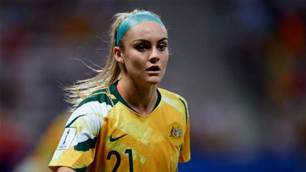Australia and New Zealand have been officially confirmed as the joint-hosts of the 2023 Women's World Cup.
You can all breathe now.
The joint Australian and New Zealand has made sporting history, after FIFA confirmed that its selection committee chose the AsOne bid over Colombia.
It becomes the first joint bid and the first bid from the southern hemisphere to host the Women's World Cup, as well as the first bid from Oceania to host a men's or women's World Cup.
The result came down to the wire despite the Australian and New Zealand bid scoring over 12 points higher than Colombia in FIFA's official technical report, due to UEFA voting almost unanimously for the Colombian bid.
The Australia and New Zealand 'AsOne' bid scored 12 points higher on FIFA's technical report, 4.1 out of 5 as opposed to Colombia's 2.8.
This was the first time FIFA had published the results of their technical report, which provided an evaluation of the bids on commercial and organisational worth. Australia scored far higher than the Colombian bid on all counts.
UEFA voting members had reportedly claimed that they saw the Women's World Cup as a developmental tournament, which is, in itself, a controversial claim due to the size and sporting value of the tournament.
More specifically, the scope to grow women's football across such a populous and relatively disenfranchised continent in South America was seen as favourable by many key FIFA Council powerbrokers.
However, the AsOne bid, which is regarded as both commercially and operationally superior to the Colombian's and had widespread political support across the two nations, eventually won overall due to votes from the CONCACAF and CAF federations.
Colombia was also deemed a 'high risk' host selection from a commercial standpoint.
Australian Prime Minister Scott Morrison and New Zealand Prime Minister Jacinda Ardern addressing a joint letter to the FIFA Council before the decision took place.
“An Australia-New Zealand FIFA Women’s World Cup would embody our passion for women’s football and proud commitment to equality and fairness, creating a profound and enduring legacy for the future of women’s football within the region and beyond," they wrote.
“We would host a tournament FIFA can be proud of in every way possible: technical excellence, record-breaking crowds, commercial certainty and a warm embrace from our 200 different cultures.
“Football is the game that connects us all. We sincerely hope that an Australia-New Zealand FIFA Women’s World Cup will bring us all together again in 2023, when we can all celebrate humanity, community and unity through football.”
FIFA's new voting transparency process was designed to help remove the stigma surrounding allegations of corruption and backroom dealing, which have plagued FIFA's host awarding since Qatar was chosen as the host for the 2022 Men's World Cup.
Related Articles

'Timing not right': Montemurro's verdict on Matildas vacancy

Matildas: 'Fourth at the Olympics is honestly the worst place you could come'
.jpg&h=172&w=306&c=1&s=1)












